|
|
|
Sort Order |
|
|
|
Items / Page
|
|
|
|
|
|
|
| Srl | Item |
| 1 |
ID:
096388
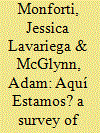

|
|
|
|
|
| Publication |
2010.
|
| Summary/Abstract |
The breadth of material covered in introductory U.S. government and politics survey courses creates a situation in which the textbooks used may serve as the primary source of information students receive about the country's political system. At the same time, their content represents a conscious choice by the authors, editors, and publishers of these textbooks regarding what topics and content are necessary and worthy of publication, which socializes students to accept particular viewpoints of the formation and operation of the U.S. government. Oftentimes, the information presented in textbooks across subdisciplines ignores the political experiences and influence of racial, ethnic, and other minority groups. We test this premise by engaging in a study of 29 introductory U.S. government and politics textbooks to assess the level of coverage and treatment of Latinos/as, the fastest growing racial/ethnic group in the country. We find that the discussion of Latinos in these textbooks is incredibly brief and often limited to the civil rights chapters. Furthermore, Latinos are primarily mentioned in the discussion of immigration, while their overall contributions to the political development of the United States are largely ignored.
|
|
|
|
|
|
|
|
|
|
|
|
|
|
|
|
| 2 |
ID:
107911
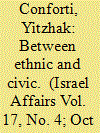

|
|
|
|
|
| Publication |
2011.
|
| Summary/Abstract |
This article addresses two basic issues of the Zionist vision: 1. Was the Jewish state planned as an ethnic or civic state? 2. What was the character of the Zionist vision? Was it a holistic utopian vision, or a minimalist vision for creating a Jewish national state? This research concludes that the state of Israel, which developed from a nationalist ethnic-cultural movement, integrated within it ethnic values as well as Western civic values. The founders of the central wing of the movement all aspired to create a Jewish national state that upheld these values. Furthermore, the planning of the Zionist Utopia by the central group of the Zionist leadership was usually realistic and minimalist, not holistic. This position enabled the leadership to strike a balance between vision and reality, and to address the historical circumstances on the path toward establishment of the state.
|
|
|
|
|
|
|
|
|
|
|
|
|
|
|
|
| 3 |
ID:
084896
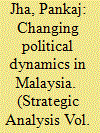

|
|
|
|
|
| Publication |
2009.
|
| Summary/Abstract |
The 12th Malaysian general elections have been significant in more ways than one. Most importantly, the opposition unity combined with the grievance vote of the ethnic minorities challenged the United Malays National Organisation hegemony long prevalent in Malaysian politics. The Bersih rally and Hindraf agitation that saw large-scale mobilisation before the elections also points to the active participation of civil society. The socio-economic marginalization of the ethnic minorities, erosion of religious rights, corruption, and unemployment accelerated such a change in the political scenario. This paper looks into different facets of the changing political dynamics in Malaysia and the role of ethnic minorities. It also looks into the policy options before India with regard to ethnic Indians in Malaysia.
|
|
|
|
|
|
|
|
|
|
|
|
|
|
|
|
| 4 |
ID:
086861
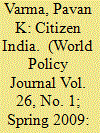

|
|
|
|
|
| Publication |
2009.
|
| Summary/Abstract |
Winston Churchill once said that India is merely a geographical expression-no more a single country than the equator. His colonial assumption was that the Indian nation was a creation of the British, and that prior to it there was only collection of competing diversities-linguistic, ethnic, religious, regional, and political.
|
|
|
|
|
|
|
|
|
|
|
|
|
|
|
|
| 5 |
ID:
120360
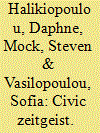

|
|
|
|
|
| Publication |
2013.
|
| Summary/Abstract |
This article examines the relationship between nationalism and liberal values and, more specifically, the redefinition of boundaries between national communities and others in the rhetoric of radical right parties in Europe. The aim is to examine the tension between radical right party discourse and the increasing need to shape this discourse in liberal terms. We argue that the radical right parties that successfully operate within the democratic system tend to be those best able to tailor their discourse to the liberal and civic characteristics of national identity so as to present themselves and their ideologies as the true authentic defenders of the nation's unique reputation for democracy, diversity and tolerance. Comparing the success of a number of European radical right parties ranging from the most electorally successful Swiss People's Party, the Dutch Pim Fortuyn List and Party for Freedom to the more mixed French Front National, British National Party and National Democratic Party of Germany we show that the parties that effectively deploy the symbolic resources of national identity through a predominantly voluntaristic prism tend to be the ones that fare better within their respective political systems. In doing so, we challenge the conventional view in the study of nationalism that expects civic values to shield countries from radicalism and extremism.
|
|
|
|
|
|
|
|
|
|
|
|
|
|
|
|
| 6 |
ID:
146344
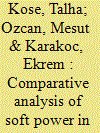

|
|
|
|
|
| Summary/Abstract |
This study explores the relationship between ethnic, sectarian, and religious identities and soft power in the Middle East and North Africa (MENA) region in the immediate aftermath of the Arab Uprisings. Utilizing original public opinion surveys conducted in Egypt and Iraq in 2012, we find that identity-based allegiances play a major role in groups’ choices regarding which countries’ increasing involvement in the region are seen favorably and which countries are seen as an ideal model for the region. Sunnis are likely to view Turkey and Saudi Arabia positively in both regards, whereas Shiites are more supportive of Iran. But our results also suggest that crosscutting cleavages should not be overlooked: Sunni Kurds are less likely to hold positive attitudes toward Turkey and Saudi Arabia. Our findings also show that Copts, a religious minority in Egypt, hold positive attitudes toward the United States and negative ones toward Saudi Arabia and Iran. These findings contribute to both the theoretical literature on soft power and the debates on international competition for influence in the MENA region by emphasizing the role of ethnic and religious identities in shaping attitudes toward international actors.
|
|
|
|
|
|
|
|
|
|
|
|
|
|
|
|
| 7 |
ID:
107273
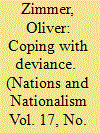

|
|
|
|
|
| Publication |
2011.
|
| Summary/Abstract |
This article highlights two processes that shaped Swiss nationhood in the long nineteenth century. The first concerns the competition between different nation-states and the nationalist visions these contests engendered. In a Europe dominated by the norm of the culturally and ethnically homogenous nation, the Swiss authorities, public intellectuals and various political representatives were desperate to display an image of national authenticity to the outside world. The result was a nationalism that combined voluntaristic and organic elements. In the second and main part of this article, the focus turns on citizenship; it is conceived not only as a social and legal institution, but also as a cognitive prism through which people defined their membership in the national community. Remarkably, the authority in granting national citizenship to foreign nationals remained firmly in the hands of the cantons and, above all, the Swiss municipalities. In practical terms, this meant that the Gemeinde provided the institutional and cognitive frame through which nationhood was primarily experienced, imagined and defined. While Switzerland represents a particularly strong case of a communalist polity, it should not be treated as unique. Instead, it should alert us to a potentially fertile yet little-explored area of research: what might be called the communal embededdness of the national(ist) imagination.
|
|
|
|
|
|
|
|
|
|
|
|
|
|
|
|
| 8 |
ID:
158094
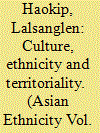

|
|
|
|
|
| Summary/Abstract |
Creative literature and audio-visuals provide alternative sources to archival documents for understanding the cultural history of land. This paper is a small beginning in using creative sources in different languages of Manipur. My analysis suggests that the association between land and ethnicity is a recent phenomenon. In the late 1950s and the 1960s, creative artists represented land as aesthetic symbol for universal emotions. In the 1970s, land was de-linked from political imagination and appeared in the form of leikai (residential address). The 1980s registered the emergence of complex social forces such as ethnic nationalism and a romanticised folk culture. The most remarkable development was the exclusive use of land as a symbol of discrete identities and ethnic homelands. Whereas the ethnic gulf widened between the meiteis of the valley and the tribals of the hill areas, the struggle between the hill tribes intensified in the 1990s.
|
|
|
|
|
|
|
|
|
|
|
|
|
|
|
|
| 9 |
ID:
140733
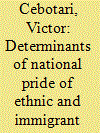

|
|
|
|
|
| Summary/Abstract |
This article focuses on the determinants of national pride in relation to ethnic diversity. Using pooled cross-sectional data from the World/European Values Survey (N = 43,909), a multilevel analysis method is applied to examine the impact of discrimination, poverty, and self-perceived social status on the feelings of national pride of individuals who belong to ethnic and immigrant minorities in Europe. Results show that, while national pride is generally low among minorities, it peaks when individuals who are members of ethnic and immigrant minorities are poor and when they themselves adopt discriminatory attitudes. These findings imply that the context of discrimination and poverty, when combined with the status of the ethnic and immigrant group in the country, serve as important mediating factors for the way minorities choose to identify with the nation.
|
|
|
|
|
|
|
|
|
|
|
|
|
|
|
|
| 10 |
ID:
084474
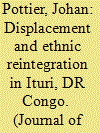

|
|
|
|
|
| Publication |
2008.
|
| Summary/Abstract |
This article examines the ethnic character of Ituri's complex emergency. It considers the local context in which the IDP predicament has unfolded, asking questions about the prospect of, and responsibilities for, post-conflict reintegration. As militia disarmament and peace are linked but not coterminous, it is argued that militant ethnic agendas at the core of the conflict must be scrutinised for their ongoing significance. Revealing the past to be a contested terrain, these agendas call for an apartheid-style solution along lines of segregation first envisaged by Belgian colonialists. To move towards ethnic reintegration, Iturians face the challenge that they must create a common history freed from the stranglehold of extremist interpretations.
|
|
|
|
|
|
|
|
|
|
|
|
|
|
|
|
| 11 |
ID:
058940
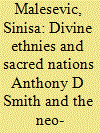

|
|
|
| 12 |
ID:
095094
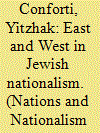

|
|
|
|
|
| Publication |
2010.
|
| Summary/Abstract |
This article analyses the ethnic and civic components of the early Zionist movement. The debate over whether Zionism was an Eastern-ethnic nationalist movement or a Western-civic movement began with the birth of Zionism. The article also investigates the conflict that broke out in 1902 surrounding the publication of Herzl's utopian vision, Altneuland. Ahad Ha'am, a leader of Hibbat Zion and 'Eastern' cultural Zionism, sharply attacked Herzl's 'Western' political Zionism, which he considered to be disconnected from the cultural foundations of historical Judaism. Instead, Ahad Ha'am supported the Eastern Zionist utopia of Elchanan Leib Lewinsky. Hans Kohn, a leading researcher of nationalism, distinguished between 'Eastern' and 'Western' nationalist movements. He argued that Herzl's political heritage led the Zionist movement to become an Eastern-ethnic nationalist movement. The debate over the character of Jewish nationalism - ethnic or civic - continues to engage researchers and remains a topic of public debate in Israel even today. As this article demonstrates, the debate between 'Eastern' and 'Western' Zionism has its foundations in the origins of the Zionist movement. A close look at the vision held by both groups challenges Kohn's dichotomy as well as his understanding of the Zionist movement.
|
|
|
|
|
|
|
|
|
|
|
|
|
|
|
|
| 13 |
ID:
106315
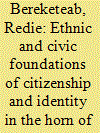

|
|
|
|
|
| Publication |
2011.
|
| Summary/Abstract |
The article seeks to analyse the ethic and civic forms of citizenship and identity in the Horn of Africa. Ethiopia and to some extent Sudan are pursuing the ethnic model. While Eritrea and Djibouti pursue the civic model, Somalia represents a special case. Ethnic citizenship may guarantee equal rights, self-rule, and self-fulfilment; however, it could also be a cause of division and irredentism. Civic citizenship could create unity and cohesion in polyethnic societies; it could also lead to majority domination. The article contends that both models are relevant where the national level could be served by the civic model and the sub-national is served by the ethnic model. The article concludes that the politics of domination are the main obstacle to the equal rights of citizens, and therefore politics of domination should be replaced by the politics of rights.
|
|
|
|
|
|
|
|
|
|
|
|
|
|
|
|
| 14 |
ID:
015998
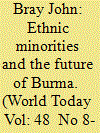

|
|
|
|
|
| Publication |
Aug-Sept 1992.
|
| Description |
144-147
|
|
|
|
|
|
|
|
|
|
|
|
|
|
|
|
| 15 |
ID:
093183
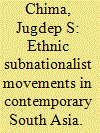

|
|
|
| 16 |
ID:
020362
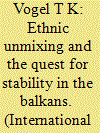

|
|
|
|
|
| Publication |
Summer 2001.
|
| Description |
481-498
|
|
|
|
|
|
|
|
|
|
|
|
|
|
|
|
| 17 |
ID:
093708
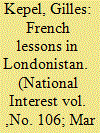

|
|
|
|
|
| Publication |
2010.
|
| Summary/Abstract |
MUSLIMS HAVE been landing on the shores of Britain and France for decades. And, as these populations arrived and settled in the Republic, Paris pursued a policy it believed would eventually lead immigrants to full cultural integration into French society. Meanwhile, London, facing a similar influx of foreigners, attempted to create a full-fledged multicultural polity. The former emphasized that what was shared between the new arrivals and their native hosts was crucial, their differences secondary. The latter argued that the British needed to respect the uniqueness of their immigrant neighbors-whether national, religious or ethnic-and that such a stance was at the core of a harmonious political system. In color-blind France, built on a long tradition of a strong, centralized state and the successful assimilation of southern and eastern Europeans-who have been migrating to the country since the nineteenth century-religious identity was not to interfere in public life. Under the French tricolor, state and nation were fused into the cradle of the one and indivisible Republic. In race-aware Britain, with Anglicanism as its established church, there was always room for different nationalities-English, Welsh, Scottish, Irish-under the Union Jack.
|
|
|
|
|
|
|
|
|
|
|
|
|
|
|
|
| 18 |
ID:
092655
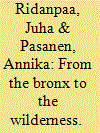

|
|
|
| 19 |
ID:
185186
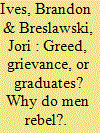

|
|
|
|
|
| Summary/Abstract |
Education is widely known for its positive effect on conventional politics and nonviolent protest as well as its suppressive effect on violence. However, recent studies have connected education to violence through its effect on relative deprivation and frustration–aggression mechanisms. We address these divergent findings by presenting a theory of the conditional effect that education has on violence. To do so, we build on literature addressing education’s positive association with political participation, such as voting and protests, and question how this relationship translates to contexts in which conventional and nonviolent channels are unlikely to be effective – specifically, in cases of politically excluded ethnic groups. We argue that education increases ethnic group members’ resources and desire to address grievances. Yet, because the ethnic group is politically excluded, opportunities for conventional politics and nonviolent protest are limited. Educated ethnic group members are limited in political options, and are thus more likely to address their grievances through the support of rebel groups, increasing the probability of violence. Violence then occurs in localities where members of a politically excluded ethnic group are located and where those members have higher levels of education. Using geo-spatial data and statistical analysis, we demonstrate that education has divergent effects on violence in areas populated by politically excluded versus politically included ethnic groups in Africa and Central America. Areas with highly educated politically excluded ethnic group members are the most likely to experience violent events.
|
|
|
|
|
|
|
|
|
|
|
|
|
|
|
|
| 20 |
ID:
128574
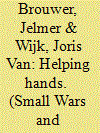

|
|
|
|
|
| Publication |
2013.
|
| Summary/Abstract |
This article analyses to what extent the Burmese KNU insurgency made use of external support from states, refugees, and diasporas. Based on extensive fieldwork it is concluded that support from neighbouring states and refugees has for years kept the Karen rebellion alive. Western countries perceived forms of resistance to the illegitimate Burmese regime as just and have therefore played a crucial role in the continuation of conflict in Karen State. It is important that policymakers and donors as well as executing organizations continue to reflect critically on the way they exercise their work.
|
|
|
|
|
|
|
|
|
|
|
|
|
|
|
|
|
|
|
|
|